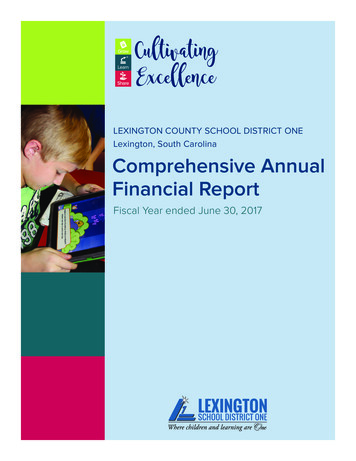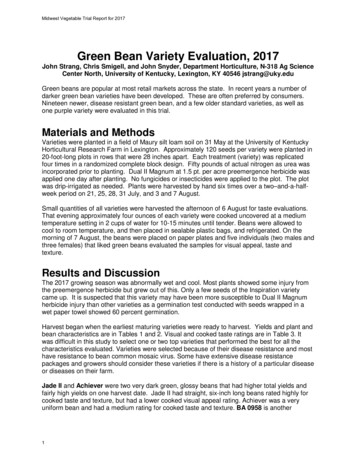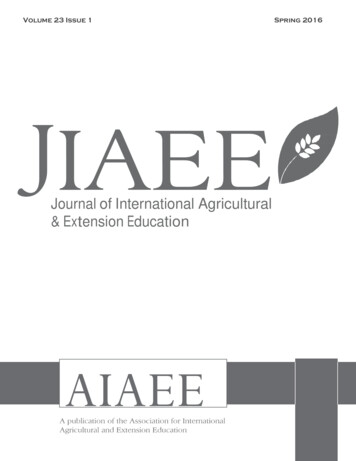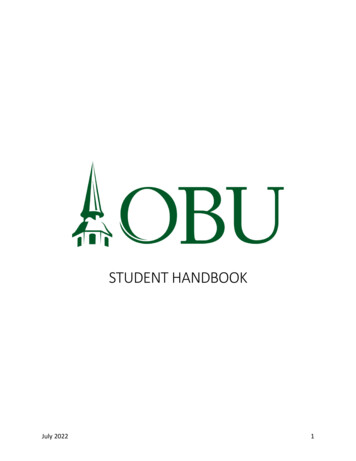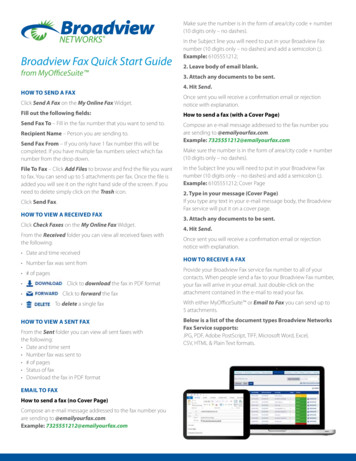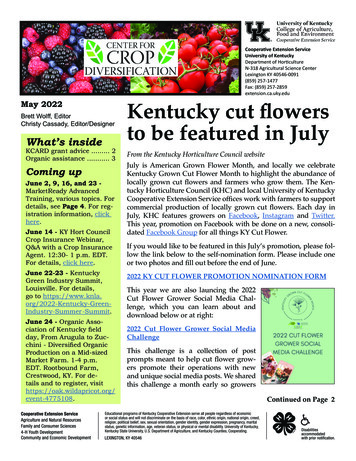
Transcription
Cooperative Extension ServiceUniversity of KentuckyDepartment of HorticultureN-318 Agricultural Science CenterLexington KY 40546-0091(859) 257-1477Fax: (859) 257-2859extension.ca.uky.eduMay 2022Brett Wolff, EditorChristy Cassady, Editor/DesignerWhat’s insideKCARD grant advice . 2Organic assistance . 3Coming upJune 2, 9, 16, and 23 MarketReady AdvancedTraining, various topics. Fordetails, see Page 4. For registration information, clickhere.June 14 - KY Hort CouncilCrop Insurance Webinar,Q&A with a Crop InsuranceAgent. 12:30- 1 p.m. EDT.For details, click here.June 22-23 - KentuckyGreen Industry Summit,Louisville. For details,go to ummer-Summit.June 24 - Organic Association of Kentucky fieldday, From Arugula to Zucchini - Diversified OrganicProduction on a Mid-sizedMarket Farm. 1-4 p.m.EDT. Rootbound Farm,Crestwood, KY. For details and to register, tucky cut flowersto be featured in JulyFrom the Kentucky Horticulture Council websiteJuly is American Grown Flower Month, and locally we celebrateKentucky Grown Cut Flower Month to highlight the abundance oflocally grown cut flowers and farmers who grow them. The Kentucky Horticulture Council (KHC) and local University of KentuckyCooperative Extension Service offices work with farmers to supportcommercial production of locally grown cut flowers. Each day inJuly, KHC features growers on Facebook, Instagram and Twitter.This year, promotion on Facebook with be done on a new, consolidated Facebook Group for all things KY Cut Flower.If you would like to be featured in this July’s promotion, please follow the link below to the self-nomination form. Please include oneor two photos and fill out before the end of June.2022 KY CUT FLOWER PROMOTION NOMINATION FORMThis year we are also launcing the 2022Cut Flower Grower Social Media Challenge, which you can learn about anddownload below or at right:2022 Cut Flower Grower Social MediaChallengeThis challenge is a collection of postprompts meant to help cut flower growers promote their operations with newand unique social media posts. We sharedthis challenge a month early so growersEducational programs of Kentucky Cooperative Extension serve all people regardless of economicor social status and will not discriminate on the basis of race, color, ethnic origin, national origin, creed,religion, political belief, sex, sexual orientation, gender identity, gender expression, pregnancy, maritalstatus, genetic information, age, veteran status, or physical or mental disability. University of Kentucky,Kentucky State University, U.S. Department of Agriculture, and Kentucky Counties, Cooperating.Continued on Page 2
KCARD outlines key stepsin grant application processFrom the Kentucky Center for Agriculture and RuralDevelopment (KCARD)We get asked all the time how to get “free money” in the form of grants for on-farm projects. Theanswer is pretty simple: there is no free money.While grants can be a helpful way to fund worthwhile projects on the farm, there is a lot of workthat goes into receiving a grant.Here are some of the key steps of the grant application process:1. Start by figuring out what your project is. Thisshould ideally be something that will have a helpful lasting impact on your farm business. You alsoneed to have an idea of how much the project willcost and what your expected timeline is.2. See if there is a grant that fits your needs. Mostgrants are very particular in what type of projectsthey will fund and who is eligible to apply. As youbrowse, make sure that you and your project areeligible for the grant and that the grant amount issuitable for your budget. Some grants also requirea match, whether cash or in-kind, so make sureyou understand what your contribution wouldneed to be. Also know that grants funding certainexpenses – such as land – are rare, if they existat all. To see what grants are available, you cancheck out our Active Grants webpage and sign upfor our Funding Matters newsletter.CCD resources updateThe Center for Crop Diversification (CCD)recently updated its crop profile on Sprouts(CCD-CP-65) and its marketing profile,Adding Value to Plant Production: An Overview (CCD-MP-14). These and many additional resources can be found on the CCDwebsite at www.uky.edu/ccd/.Continued from Page 1can have time to prepare their posts and createtheir promotion strategy.We have provided a schedule for the month ofJuly as we celebrate Kentucky Grown Cut Flower Month, but these post ideas can be used yearround. We have provided bonus prompts foryou to use whenever and however you want.3. Complete the application. Grant applicationsAnd don’t forget to put your own unique spinrequire a lot of detailed information about youron them!farm and your project. Typically, you’ll need tohave price estimates of related supplies, a pro- Kentucky Grown Cut Flower Geographicposed timeline, and any supplemental documenDirectorytation that the grant requires (a business plan, fiCheck out this interactive map. If you would likenancial projections, etc.). Make sure you start thefor your cut flower farm to be featured on the inapplication with plenty of time before the deadteractive map, please send an email to info@kyline so you have time to deal with any questionshortcouncil.org.or technology issues that might arise.4. You got the grant now what? Now it’s time forpaperwork! You’ll have to do reporting throughout the grant timeline to demonstrate progress onthe project. You have to keep relevant receipts andsubmit for reimbursement.For additional cut flower resources, check out theKHC website at urces/, and the Center forCrop Diversification website at nurseryContact KCARD at kcard@kcard.info or (859) 550-3972. ornamental/cut-flowers.2
Warmer than average startto June, precipitation uncertainBy Joshua Knight, Sr. Extension Associate, HorticultureThe NOAA’s Climate Prediction Center is forecasting an above average chance for warmer thanaverage temperatures across the first five days inJune. This pattern shifts as a cooler air mass movesfrom the northern Midwest over the Great Lakesregion down into the Ohio River Valley along thenorthern and western parts of Kentucky later inthe first week of June. Overall for the month, thereis an equal chance for warmer than average andcooler than average conditions.The prediction for precipitation is even less clear.A dry air mass stretches across the MississippiRiver to our west, while moisture dominates themid-Atlantic and southern U.S. Kentucky is between these two patterns for the first part of June,giving us equal chances of dry or wet weather. Amore experimental outlook predicts that drier airwill move across the Commonwealth around themiddle of June, but this shift is not a certainty. Thetransition during the last days of spring into summer this year is far from clear.USDA to help cover costs of organic, transitioning producersFrom the USDA Farm Service Agency (FSA)of these categories: crops, wild crops, livestock, processing/handling and state organic program fees.Agricultural producers and handlers who are certified organic, along with producers and handlerswho are transitioning to organic production, cannow apply for the USDA Organic and TransitionalEducation Certification Program (OTECP) andthe Organic Certification Cost Share Program(OCCSP), which help producers and handlerscover the cost of organic certification, along withother related expenses. Applications for OTECPand OCCSP are both due October 31st, 2022.Producers can receive cost share through bothOTECP and OCCSP. Both cover costs incurredfrom October 1st, 2021, to September 30th, 2022.Producers have until October 31st to file applications, and FSA will make payments as applications are received. To apply, producers and handlers should contact the FSA at their local USDAService Center.Thanks for reading!OTECP covers: Certification costs for organic producers andhandlers (25% up to 250 per category). Eligible expenses for transitional producers,including fees for pre-certification inspectionsand development of an organic system plan(75% up to 750). Registration fees for educational events (75%up to 200). Soil testing (75% up to 100).If you know someone who would enjoy ournewsletter, or you’re not subscribed yet yourself,visit www.uky.edu/ccd/newsletter and click“Subscribe Now.” Or call Brett Wolff at 859-2184384 , or Christy Cassady at 859-257-1477. Stay upto date with the Center on Facebook at https://www.facebook.com/ccduky/Meanwhile, OCCSP covers 50% or up to 500 percategory of certification costs in 2022.This cost share for certification is available for eachChristy Cassady, Extension Specialist3
4
Farmers market &Produce Auction Pricereports are back!www.uky.edu/ccd/pricereportsGot a Farmers Market?Wanna join our Price Report?It's EASY!Email: Brett.wolff@uky.edu for details5
Department of HorticultureN-318 Agricultural Science CenterLexington, KY, 40546-0091
Fax: (859) 257-2859 extension.ca.uky.edu. Educational programs of Kentucky Cooperative Extension serve all people regardless of economic or social status and will not discriminate on the basis of race, color, ethnic origin, national origin, creed, religion, political belief, sex, sexual orientation, gender identity, gender expression, pregnancy .

